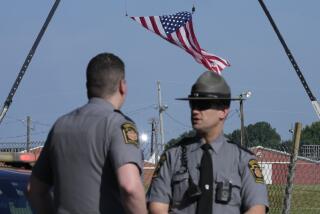Detective in Simpson case tells of disbelief
- Share via
LAS VEGAS — The police detective first dispatched to investigate reports of an armed robbery by O.J. Simpson at a down-market casino hotel testified Wednesday that his initial reaction was that it “couldn’t be true.”
“It didn’t make sense,” Det. Andy Caldwell told a jury at the former NFL star’s robbery-kidnapping trial.
The detective said it took surveillance tape from the Palace Station Hotel & Casino to convince him that two sports memorabilia dealers alleging that Simpson and five associates had robbed them were credible. “I recognized Mr. Simpson instantly,” he said of the grainy video.
Caldwell said the dealers, Bruce Fromong and Alfred Beardsley, immediately volunteered information about the central issue in the trial: the presence of weapons. “Their primary concern at the time was the fact that they had guns pointed at them,” Caldwell said.
Simpson, 61, maintains he never saw a gun during the six-minute encounter. He and codefendant Clarence “C.J.” Stewart, 54, each face a dozen charges. The most serious count -- kidnapping -- carries a potential life sentence.
Defense attorneys contend that Simpson, a Heisman Trophy winner at USC and an NFL Hall of Famer, was simply trying to retrieve stolen mementos, including pictures of his children and his late parents, on Sept. 13, 2007.
Caldwell, the first police witness to testify at the trial, walked jurors through a timeline of the investigation. He said his amazement that Simpson might be involved in a robbery in his district gave way to a decision to move cautiously against the high-profile suspect.
The detective said interviews with the two dealers and a third man, Thomas Riccio, who had arranged the meeting, suggested that Simpson had committed a crime, but officers held off taking action.
“If it was anybody else, we would have arrested him that night,” Caldwell said. “Because of who he was, we wanted to make sure we had everything right.” Simpson was arrested two days after the incident.
The detective also recounted dealings with Riccio, a colorful dealer expected to testify this week. He said Riccio never mentioned that he had surreptitiously recorded the incident, a fact detectives learned only when clips were posted on the website TMZ.
“If he had told you about it, would he have been able to make any money off of it?” prosecutor Christopher Owens asked. “No, sir, we would have seized it,” Caldwell said.
According to the defense, Riccio sold the tape for more than $100,000. Jurors are expected to hear the recording and others Riccio made before and after the incident.
An FBI audio examiner who was asked to inspect the recordings testified earlier that he could not determine whether they had been altered. The sometimes-garbled, expletive-laced recordings are expected to be a cornerstone of the prosecution’s case.
Caldwell and another investigator transcribed the tapes Riccio made after the FBI expert enhanced them. The detective acknowledged that portions of the recordings were impossible to make out.
He referred to the tape of the hotel room encounter as “nine people talking over each other” but said investigators had been able to decipher much of it.
Stewart’s defense team unsuccessfully challenged the admissibility of the tape, citing its poor quality. An attorney for Simpson’s codefendant implied that the detective was not qualified to transcribe the tapes.
On cross-examination, Stewart’s lawyer Brent Bryson asked the police witness if he had any training in a host of related fields, including “cross-racial voice identification” and linguistics. Caldwell said he did not.
Outside the jury’s presence, prosecutors announced that they had constructed a replica of the hotel room in the basement of the courthouse “for demonstrative purposes.”
Bryson said he was opposed to letting jurors tour the replica because the lighting and ceiling were different from those in the real hotel room. “We’re going to have an issue with that,” Bryson said.
District Judge Jackie Glass said she would hear arguments about the matter today. The judge said she had denied a previous prosecution request to take the panel on a field trip to the casino to see the actual room.
“I wasn’t putting a jury into a bus and taking them over there and risking their contamination,” Glass said.
--
ashley.powers@latimes.com
More to Read
Sign up for Essential California
The most important California stories and recommendations in your inbox every morning.
You may occasionally receive promotional content from the Los Angeles Times.











